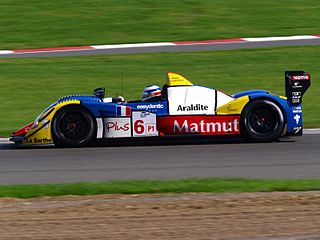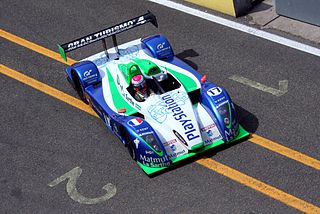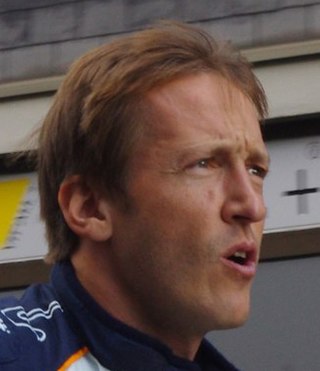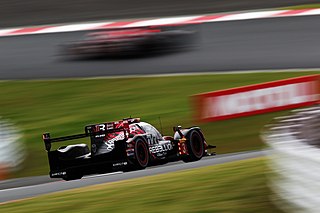
Jean-Christophe Joël Louis "Jules" Boullion is a French former racing driver. He won the 1994 International Formula 3000 Championship with DAMS, took two Le Mans Series titles with the Pescarolo Sport outfit in 2005 and 2006, and took two podium finishes at the 24 Hours of Le Mans. Boullion also competed in 11 Formula One races for the Sauber team.

ORECA is a French racing team and race car constructor, founded in 1973 and run by Hugues de Chaunac, former team manager of F1 team AGS. Oreca has had success in many areas of motorsport. Since the early 1990s the team has concentrated on running sports cars and GT cars.

The 2005 24 Hours of Le Mans was a non-championship 24-hour automobile endurance race held from 18 to 19 June 2005, at the Circuit de la Sarthe near Le Mans, France, for teams of three drivers each entering Le Mans Prototype and Grand Touring cars. It was the 73rd running of the event, as organised by the automotive group, the Automobile Club de l'Ouest (ACO) since 1923. A test day was held two weeks prior to the race on 5 June. Approximately 230,000 people attended the race.

Courage Compétition was a racing team and chassis constructor company now owned by Oreca, based in Le Mans, France, near the Circuit de la Sarthe. It was founded by Yves Courage, a French race driver who ran hillclimbs before founding the company. Following the purchase of Courage by Oreca in 2007, Yves Courage has refounded the company as Courage Technology in 2010, attempting to develop electric racing cars.

The 75th 24 Hours of Le Mans was a 24-hour automobile endurance race for Le Mans Prototype and Grand Touring cars, which took place at the Circuit de la Sarthe, near Le Mans, France, from 16 to 17 June 2007. It was the 75th edition of the event, as organised by the automotive group, the Automobile Club de l'Ouest (ACO) since 1923. Unlike other events, it was not a part of any endurance motor racing championship. A test day was held two weeks prior to the race on 3 June. The event was attended by 250,952 spectators.

The Acura ARX-01, later known as the HPD ARX-01, is a series of Le Mans Prototypes built for sports car racing, specifically in the American Le Mans Series, Le Mans Series, and at the 24 Hours of Le Mans. It is the first purpose-built race car by the Acura division of Honda Motor Company, part of their multi-year program to eventually compete in endurance race. The car debuted in 2007 in the American Le mans Series before expanding to customers in Europe. Over the years various specifications of the ARX-01 chassis have been developed, each signified by a letter suffix. In 2010 Acura withdrew their name from the program and Honda Performance Development which developed the car for Acura continued the program into 2011.

Pescarolo Sport was a motorsport team based in Le Mans, France, and founded in February 2000 by French racing driver Henri Pescarolo and his friend and partner, French publisher François Granet. They raced in the Le Mans Series and the 24 Hours of Le Mans. In October 2007, Henri Pescarolo purchased Jacques Nicolet's Saulnier Racing and created Pescarolo Automobiles, with the racing team becoming a division of the new company. The Pescarolo Automobiles went into receivership on 15 June 2010. Following a liquidation sale, the company was resold back to Henri Pescarolo and rebranded as Pescarolo Team for the 2011 season. However, the team's financial situation did not improve, and was wound up in January 2013.

The 2008 24 Hours of Le Mans was the 76th Grand Prix of Endurance, taking place on 14–15 June 2008 at the Circuit de la Sarthe, Le Mans, France, organised by the Automobile Club de l'Ouest (ACO). The test day was on June 1. The race was attended by 258,000 spectators. The Audi team's progress and victory was documented in the 2008 film Truth in 24.

The 2009 24 Hours of Le Mans was the 77th Grand Prix of Endurance, an endurance auto race run over 24 hours. It took place at the Circuit de la Sarthe, Le Mans, France, and was organised by the Automobile Club de l'Ouest (ACO) over 13–14 June 2009 and was started by Fiat and Ferrari chairman Luca Cordero di Montezemolo at 15:00 local time. A test day was initially scheduled for 31 May that year, but was canceled by the ACO due to economic concerns. The race was attended by 234,800 spectators.

Harold Primat is a French-born Swiss racing driver who previously competed in the Blancpain Endurance Series and other long-distance events such as the Bathurst 12 Hour and Nurburgring 24 Hours.

João Ricardo da Silva Coelho Barbosa is a Portuguese auto racing driver. He currently competes in the IMSA WeatherTech SportsCar Championship for Sean Creech Motorsport in the LMP2 class.

The 78th 24 Hours of Le Mans was a non-championship 24-hour automobile endurance race for teams of three drivers each fielding Le Mans Prototype (LMP) and Grand Touring (GT) cars held from 12 to 13 June 2010 at the Circuit de la Sarthe, near Le Mans, France, before 238,150 spectators. It was the 78th 24 Hours of Le Mans as organised by the Automobile Club de l'Ouest (ACO).

The 2009 1000 km of Spa was the second round of the 2009 Le Mans Series season. It occurred at the Circuit de Spa-Francorchamps, Belgium, on May 10, 2009. Several teams tested at Spa before the 24 Hours of Le Mans, including eventual winners Team Peugeot and Team Essex Porsche, as well as the Jetalliance Racing Aston Martin. This is the 28th European Le Mans Series race since 2004.

The 79th 24 Hours of Le Mans was a 24-hour automobile endurance race for 56 teams of three drivers in Le Mans Prototype (LMP) and Le Mans Grand Touring Endurance (LMGTE) cars, held before 249,500 spectators on 11 and 12 June 2011 at the Circuit de la Sarthe, near Le Mans, France. It was the third round of the 2011 Intercontinental Le Mans Cup and the race's 79th edition as organised by the automotive group the Automobile Club de l'Ouest (ACO) since 1923. On 24 April, six weeks prior, a test day was held.

OAK Racing is an endurance racing team specialising in sports prototypes based in Le Mans, France. In 2013 it won the 24 Hours of Le Mans in LMP2 class and the 2013 FIA WEC World Champion drivers and teams on LMP2 class.
The 2012 FIA World Endurance Championship was the inaugural running of the World Endurance Championship. It was co-organised by the Fédération Internationale de l'Automobile (FIA) and the Automobile Club de l'Ouest (ACO). The series replaced the former Intercontinental Le Mans Cup held by the ACO from 2010 to 2011. The series was open to Le Mans Prototypes and grand tourer-based racing cars meeting four ACO categories. Several championships, cups, and trophies were awarded in the series' four categories following an eight race season, with a World Championship available to the top scoring drivers and LMP1 category manufacturer.

Rebellion Racing was a Swiss racing team that competed in endurance racing. The team competed in the 2011 Intercontinental Le Mans Cup season and won the LMP1 teams' title in the 2011 Le Mans Series season. The team started as an association between Speedy Racing and Sebah Racing, which began in 2008. Rebellion Racing's last team principal was Alexandre Pesci and the team manager was Bart Hayden.
Matthieu Lahaye is a French racing driver, competing in the FIA World Endurance Championship for OAK Racing. Along with his brother Jean-Baptiste, he runs a small sports car racing team called Ultimate.

The Courage C60 was a Le Mans Prototype (LMP) racing car built by Courage Compétition in 2000, and used in international sports car races until 2006. A replacement for the Courage C52, it was Courage's first all-new prototype since the Courage C41 was built in 1994.

Ligier Automotive, formerly Onroak Automotive, is a French company which designs, manufacturers, and sells racing cars, specifically sports prototypes for various international series. Onroak was founded in 2012 by Jacques Nicolet who split the design, manufacturing, and sales divisions of his OAK Racing team into an independent company. Onroak has since formed an agreement with Philippe Ligier, the son of Formula One driver Guy Ligier, to develop new cars under the Ligier brand. On 31 December 2018, it was announced that Onroak Automotive would be rebranded to Ligier Automotive as part of a rebranding and reorganization of Everspeed's automotive assets.

















